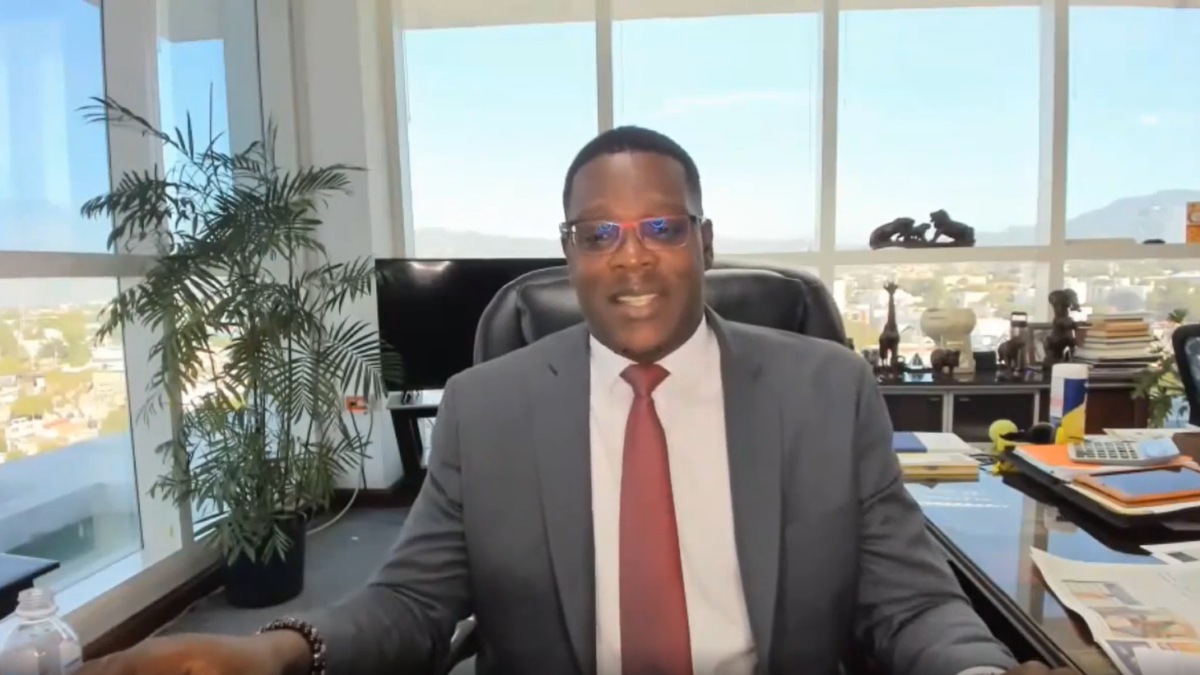CANTO 38TH AGM : Public/Private Sector Partnerships Needed To Close The Digital Divide
Private-Public Sector Partnerships like an Emergency Broadband Benefit (EBB) Programme, is promoted as a possible solution to bridge the digital divide in Latin America and the Caribbean. This from Mr. Stephen Price, Vice President & General Manager of regional telecommunications operator out of Jamaica; FLOW. Mr. Price delivered the keynote address on the first day of CANTO’s 38th Annual General Meeting (AGM) held virtually under the theme Enabling the Digital Evolution on February 10th and 11th 2022. Stakeholders in the telecommunications industry, including operators, regulators, vendors and suppliers of infrastructure and equipment and members of academia were among the 400 persons registered for the two-day event.
Mr. Price explained that in 2020 and 2021, governments across the region embarked on “shutdowns” and the curtailing of activity in a bid to curb the spread of the SARS COV 2 virus, the pathogen responsible for the COVID 19 pandemic. Non-essential workers were asked to work remotely, small and medium business enterprises were forced to transact business online in order to remain operable, and online learning replaced face-to-face tuition at all levels. With Caribbean broadband penetration rates lower than 50 percent; this heavy and sudden reliance on digital technology exposed the gaps in connectivity across the region. The pandemic, however, introduced as many innovations as it did disruptions with regional operators rising to the challenge of ensuring the infrastructure to support broadband access was in place and available. Access, however, was not the only requirement, as cost remained a deterrent for low-income households across the region.
Drawing on examples from the United States of America, Costa Rica and FLOW’s response to the crisis in Jamaica, Mr. Price advocated for public-private partnerships to bridge the digital divide and increase broadband adoption under what is termed an “Emergency Broadband Benefit” Programme. He said the region must explore the creation of “partnerships with the internet service provider (who has the infrastructure and technology to connect), the local government (who determines the best way to support the community and lift up its most vulnerable population), and the community organisations (who are trusted and already connected to the community members)” in order to promote digital inclusion. He also called for governments to consider the removal (in part or in total) of taxes on devices and encouraged operators to work towards the provision of subsidised broadband service to qualifying low-income households to ensure that everyone has access to the connectivity needed for work, school, health care services, and more. Partnerships with community organisations, he added, could also provide at-risk communities and families with the digital literacy training and other adoption support needed to bridge the digital divide and foster inclusion.
The Covid 19 pandemic also brought into focus the necessity for digital transformation across the region. Digital transformation refers to the integration of digital technology into business, learning, and financial and government services. Digital technologies are being used to create new, or modify existing business processes, culture, and customer experiences in a bid to meet evolving business and market requirements. The 38th AGM heard from subject matter experts in a session called the CEO’s Forum on the requirements necessary for harnessing and accelerating the region’s digital evolution and transformation.
Participants heard from Cable and Wireless’ Mr. Jenson Sylvester on the pillars needed to support the digital transformation of the Caribbean. He proffered three pillars:
–Digital infrastructure, as measured by data such as mobile cellular subscriptions, fixed broadband penetration, active broadband subscription and percentage of persons using the internet;
–Digital platforms, which examines the cyber security index, the percentage of population with access to 3G coverage and the eGov Index; and
–Facilitation systems as represented in digital financial services, ease of doing business, the human capital index, the regulatory environment, and digital entrepreneurship.
Mr Sylvester noted that while regional infrastructure is modest and growing, much more work is required in some territories to address the issue of reliability and capacity of the infrastructure. Regarding digital platforms, the security of the service software is a concern as there are no strategies, on a national level, to thwart and address the issue of cyber-attacks and incidents. And in the area of facilitation, the development of appropriate human capital to create digital solutions specific to the challenges and opportunities of the region is needed. Not only are persons with the right skills needed, but there is also the requirement for the development of appropriate revenue model(s), to encourage investment. Mr. Sylvester also saw the multiple regulatory environments across the region as deterrent to any digital transformation thrust.
Also making a contribution to the discussion in the CEO’s Forum was Mr. Mike Antonius, Chief Executive Officer (CEO) at Telesur, Suriname. Operators, he noted, have placed much emphasis on building out infrastructure but not enough on customer service. More thought must be given to how customers are accommodated especially during service disruptions. He added that the increasing numbers of persons working and learning from home, has meant that there is an immediacy with which the service is required.
Mr. Damian Blackburn, CEO at Guyana Telephone and Telegraph Company noted that while it seemed that multinational big-tech firms had a cornered revenue streams in the sector, there is tremendous opportunity for operators to create win-win scenarios by providing digital solutions specific to its customer and community base. Using the example of the elimination of paper billing in Guyana, he added, that the digital sector needs role models; and operators working in collaboration with regulators can bring innovations to not only to the sector but the whole society.
Also contributing to the discussion on harnessing and accelerating the region’s digital transformation in the CEO’s Forum was Digicel Trinidad and Tobago’s CEO Abraham Smith. Commenting on the decline in the volume of voice calls favouring in its place an exponential rise in data usage, he said the sector must continue to evolve to meet the changing needs of its customers and the market. The market, he added, has grown and will continue to expand beyond simply the provision of connectivity.
The AGM also provided its stakeholders with insights on how other sectors were effecting their own digital transformation.
Speaking directly to telecom operators, Senior Director Mr., Andrea Canessa from the cloud computing firm, Oracle, indicated that increasingly, cloud computing is providing the support that industries require to pivot and transform digitally. Telecommunications operators, like actors in other industries, he noted will be required to modify their service offerings as customer needs and expectations, evolve. Telecomm operators must be prepared to gain data driven insights from their business, networks and customers, expand revenues beyond the simple supply of connectivity, ultimately transforming into an experience-first organisation, Mr. Canessa said. As the business and way revenue is generated changes, operators must be prepared to cut costs, gain agility and fuel innovation in order to survive and thrive.
The afternoon of day two of the AGM focused on the main business of the Meeting. Chairman of the Board of Directors of CANTO, Mr. David Cox led the 38th AGM in the hearing and acceptance of reports of Committees of the Board and the Secretariat. CANTO consists of a general assembly, a Board of Directors, and a Secretariat, headed by a Secretary General who is supported by the Secretariat Staff. Chairman Cox, also lead the AGM in the hearing and acceptance of audited financial statements for the 2020/2021 and the projected expenditure for 2022.
The 38th AGM also voted in two new member organizations to the Board of Directors: Digicel Trinidad & Tobago, represented by Mrs. Desha Clifford and the Telecommunications Services of Trinidad and Tobago (TSTT), represented by Ms. Christa Leith.



